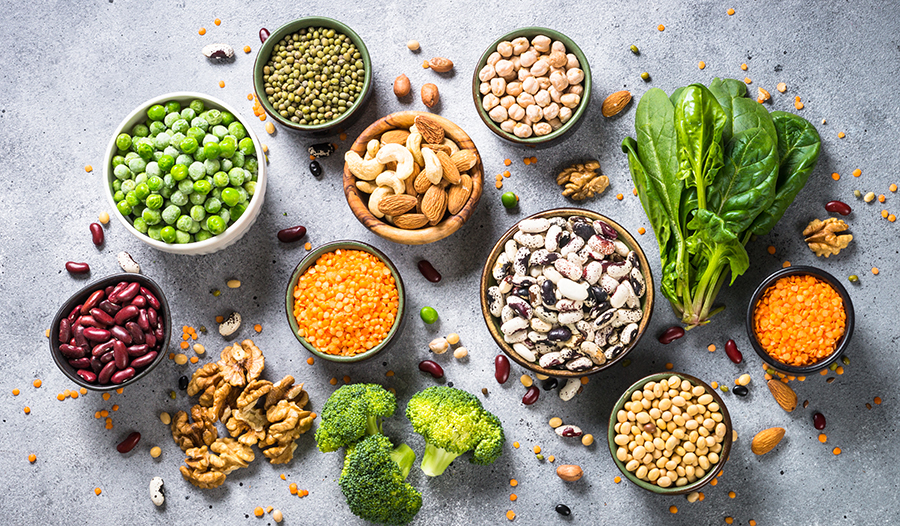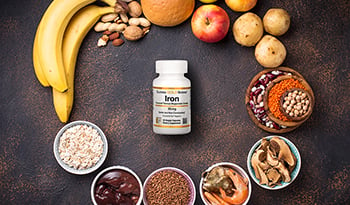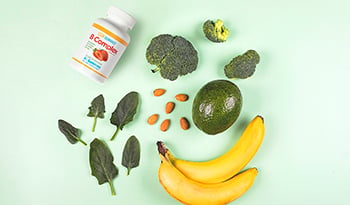Why Vegans May Need an Iron Supplement
DISCLAIMER:This blog does not intend to provide diagnosis...
- In this article:
- Types of Iron: Heme Vs. Non-heme
- Importance of Iron Intake
- Food Sources of Iron
- Increasing Iron Absorption in a Vegan Diet
- Foods to Avoid When Taking Iron Supplements
- Picking the Best Vegan Iron Supplement
- Recommended Amounts of Iron for Vegans
- Types of Vegan Iron Supplements
- Side Effects of Iron Supplements
- Takeaway

Are you looking for the best iron supplement but are concerned about animal products hiding in the ingredients list? Totally understandable. Animal products can hide everywhere—even in supplements. Fortunately, a variety of vegan iron supplements are available for you to choose from.
Getting enough iron is important for plant-based eaters since this nutrient can be overlooked when going vegan. With a bit of planning and assessing your intake, getting the iron your body needs from plants is easy.
In some cases, taking an iron supplement can also help increase your levels of this essential nutrient. Always talk with your doctor before making any changes to your supplement routine.
Types of Iron: Heme Vs. Non-heme
The two types of iron found in foods are heme iron and non-heme iron:
- Heme iron: The most readily absorbed form of iron, heme iron is found only in animal foods, like animal meats and other animal products. The bioavailability of iron from diets that include animal foods like meat and seafood is about 14 to 18%.1
- Non-heme iron: This type of iron comes from plant- and animal-based foods. Non-heme iron has a bioavailability of 5% to 12% from vegetarian diets.1
Although heme iron is absorbed more readily than non-heme, you can still meet your body’s needs for iron through a plant-based diet—you’ll just want to eat a variety of iron-rich foods and find ways to maximize absorption so your body can make use of the iron you’re consuming.
Importance of Iron Intake
Iron is one of the most important minerals in our diets and is needed to prevent iron-deficiency anemia. An estimated 6% of the U.S. population is anemic—so this isn’t just a vegan problem, but a whole population problem.
Our bodies need iron to stay healthy and function properly. Iron helps make red blood cells and energy and helps our bodies absorb oxygen. Your body needs iron daily, so getting enough from your diet or supplementation is essential.
Food Sources of Iron
- Beans
- Lentils
- Spinach
- Tofu
- Dark chocolate
- Cashews
- Raisins
While a well-planned plant-based diet can certainly meet your iron needs, some plant-based diets are not rich in iron. Analyzing your nutrient intake can help you determine how much iron you’re actually getting and whether you need a supplement.
Taking a supplement is essential if you’re not meeting your body’s iron needs through your diet. Iron supplements can help you bridge the gap between the amount of iron you consume through food and the amount your body needs daily.
Increasing Iron Absorption in a Vegan Diet
Since vegan diets contain only non-heme iron, it’s especially important to be aware of foods that promote or inhibit iron absorption.
Pairing foods high in vitamin C with iron-rich foods helps the body absorb more iron. Some vegan iron supplements even add vitamin C to their formulations to increase absorption. Vitamin C-rich foods that can improve your body’s absorption of iron include:
- Oranges
- Kiwi
- Sweet red peppers
- Strawberries
- Tomatoes
- Kale
- Broccoli
Foods to Avoid When Taking Iron Supplements
While certain foods increase your body’s absorption of iron, others can actually interfere with your body’s ability to absorb the iron you consume. Tannins, a type of polyphenol found in foods and beverages like coffee, tea, and wine, block iron absorption.
Do your best to avoid consuming coffee, tea, and wine at the same time that you take your vegan iron supplements. Additionally, sources of calcium, like soy milk, tofu, and calcium supplements, may also prevent iron absorption.1
The best time to take your iron supplement might be right when you wake up or at bedtime, depending on your routine. Since iron supplements can interfere with the efficacy of certain medications, always check with your doctor before making any changes to your medications or supplements.
Picking the Best Vegan Iron Supplement
When looking for a vegetarian or vegan iron supplement, consider the type of iron in the supplement. Some supplements may use animal-based iron sources, making them unsuitable for people seeking plant-based options. When shopping at iHerb.com, you can easily filter your iron supplement search results by selecting "certification and diet" and then choosing "vegan."
Iron supplements come in different dosages and strengths. Make sure you understand the amount of iron your body needs so you can choose a supplement that’s appropriate for you. You don't want to exceed the upper limit or take a supplement if you don't need it. The recommended dietary allowances for all adults are listed below.
The last tip for picking the best vegan iron supplement is to look at how the supplement is formulated. Some iron supplements come in an easier-to-absorb form that can lower the time your body takes to process it, making it more efficient than other forms.
Recommended Amounts of Iron for Vegans
Your body needs a certain amount of all the nutrients in the foods you eat. The Food and Nutrition Board at the Institute of Medicine sets this amount by determining the average daily intake level that meets the nutrient requirements for 97 to 98% of healthy individuals. This amount is known as the recommended dietary allowance, or RDA.2
The RDA for iron is as follows:1
- Adult men aged 19-50 years: 8 mg
- Adult women aged 19-50 years: 18 mg
- Pregnant people: 27 mg
- Lactating people aged 19-50 years: 9 mg
- Women 51+ after menopause: 8 mg
The Tolerable Upper Intake Level (UL), or the maximum amount recommended daily, for iron is 45 mg for everyone over 14 years old and lower for children. Unless otherwise indicated by a healthcare provider, this is the maximum daily intake that anyone should take. Exceeding this amount can cause harmful effects on health. The UL is only applicable to supplements and not food sources of iron.
Because non-heme iron is less bioavailable than heme iron, some studies recommend that vegans and vegetarians consume 1.8 times more dietary iron than people who eat animal foods.3
Types of Vegan Iron Supplements
There are quite a few different types of iron supplements. Some of the most common formulations are ferrous sulfate, ferrous gluconate, ferric citrate, and ferric sulfate, which are all plant-based and contain non-heme iron.
Ferrous
Ferrous iron is a popular pick for iron supplements. It is more bioavailable than ferric iron, so it may be better absorbed.
- Ferrous Sulfate
- Ferrous Gluconate
Ferric
- Ferric Citrate
- Ferric Sulfate
The ferrous and ferric options listed above are non-chelated forms.
Chelated
Chelated iron is thought to be better for the digestive system since it passes through the GI tract easier. However, it may still cause digestive side effects. Chelated iron is available as a supplement but isn’t typically found in food.
- Chelated Iron
Take these factors into consideration before purchasing a vegetarian or vegan iron supplement. Price can also be a factor, but with a wide range of iron supplements, you should be able to find one that works well for you.
Side Effects of Iron Supplements
While iron supplements can help some reach their daily needs, they do have certain downsides. Occasionally, supplementing with iron can cause constipation, nausea, and digestive distress. Additionally, iron supplements can interact with other medications like antibiotics, antacids, and thyroid medication. Always consult your healthcare provider before taking any supplement.
Takeaway
If your iron levels or intake are low, your doctor may recommend an iron supplement to help you meet your needs. Remember, your multivitamin may also contain iron, so consider the amount of each vitamin and nutrient in all your supplements, so you take the correct amount and not too much. Now that you know your options for iron supplements, you have the tools to pick the right one for your body and lifestyle.
Remember, always check with your healthcare team before trying any new supplements. Only choose high-quality supplements that are third-party tested and don't exceed the upper limit of iron supplementation.
References:
- Iron - Health Professional Fact Sheet. Accessed April 3, 2023. https://ods.od.nih.gov/factsheets/Iron-HealthProfessional/
- What are Dietary Reference Intakes? - Dietary Reference Intakes - NCBI Bookshelf. Accessed April 3, 2023. https://www.ncbi.nlm.nih.gov/books/NBK45182/
- Dietary Iron - StatPearls - NCBI Bookshelf. Accessed April 3, 2023. https://www.ncbi.nlm.nih.gov/books/NBK540969/

 By Rhyan Geiger, RDN
By Rhyan Geiger, RDN


